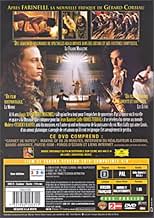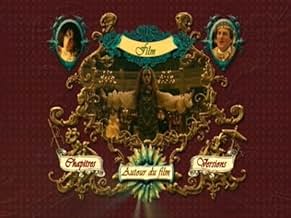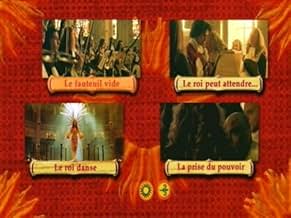Le roi danse
- 2000
- Tous publics
- 1h 55min
Ajouter une intrigue dans votre langueCorbiau repeats the Farinelli formula, artistic rivalry and social private drama expressed in dazzling, sometimes excessively lavish baroque scenery, music and costume, but this time in its ... Tout lireCorbiau repeats the Farinelli formula, artistic rivalry and social private drama expressed in dazzling, sometimes excessively lavish baroque scenery, music and costume, but this time in its ultimate setting: Versailles. There are two protagonists - first the title character, Loui... Tout lireCorbiau repeats the Farinelli formula, artistic rivalry and social private drama expressed in dazzling, sometimes excessively lavish baroque scenery, music and costume, but this time in its ultimate setting: Versailles. There are two protagonists - first the title character, Louis XIV, the French sun-king who has two passions, establishing absolute rule over the realm... Tout lire
- Réalisation
- Scénario
- Casting principal
- Récompenses
- 1 victoire et 5 nominations au total
- Prince de Conti
- (as Idwig Stephane)
Avis à la une
I had the fortune of meeting the choreographer of the film, Béatrice Massin, who attended the screening. She is THE authority of Baroque dance in France, after having worked with Francine Lancelot, who was the pioneer in the restoration of Baroque dance into its original form. Massin works with original dance notation materials from Louis XIV's time, especially the Feuillet notations, which provided very detailed and exact instructions on the dance steps used at Louis XIV's court. This dance form is very important because it is the origin of today's ballet, which has gone through a lot of transformations, especially from that of a male-only art form to one where the female dancer dominates the stage.
During production, Massin worked with the lead roles in the movie every day for three months, and she has high regard for Benoît Magimel. Though not a professional dancer, he attempted all the dance sequences with courage, never uttering the words "I can't." Of course, the repertoire of Baroque dance was wide-ranging and Massin could not possibly have included all the varieties of that era. She mainly worked in such a way to show what the director wanted. In the context of this movie, the director had wanted to show the masculine power that the king wanted to demonstrate, as a way to consolidate his power on the throne. So what we see in the movie comes across as very forceful, masculine movements.
One thing that the film has left out - what Massin feels as a mistake - is the character of Pierre Beauchamps. Beauchamps was the key dance master at Louis XIV's court and was responsible for dance education and choreographer, although he was also a musician - not as accomplished as Lully at that, while Lully's dancing skills would pale alongside Beauchamps'. In fact, Lully, Beauchamps and Molière were working very closely together. For me, it is a big, big regret that this movie, whose theme is Louis XIV's passion and talent for dance, has treated Beauchamps in such a dismissive manner (the only scene where he appeared was when the king asked him to leave the room and rearrange the choreography, to give it "more air!").
Another thing that I miss seeing is the establishment of l'Académie Royale de la Dance. Surely, the film shows that the king announced it in a royal decree as soon as he took over all the power upon Mazarin's death. But it would have been nice to see a snippet of the academy's activities, such as how the first group of professional ballet dancers were trained.
Unlike what some of the commentators here have said, though, I think that the film does have a deep aspect. The idea that Louis XIV cared so much about the art of dance and music and Lully's concept of music being something to make the king immortal -- points to the transcending nature of these arts. Although dance and music was used as much as a political tool for power as a form of entertainment at the court, I personally feel that the passion for dance and music - as a pure form of truth and beauty - is powerfully expressed through the dramatic performances of the actors and actresses in this film.
Anybody who loves the subject of Louis XIV, Baroque music, dance and ballet should go and see this film.
Le saviez-vous
- AnecdotesThe small violin Lully plays when conducting the orchestra is called a 'pochette', so called because it could be carried in a coat pocket.
- ConnexionsFeatured in L'aventure humaine: La véritable histoire de d'Artagnan (2021)
- Bandes originalesTe Deums: Symphonie
Written by Jean-Baptiste Lully
Conducted by Reinhard Goebel
Performed by Musica Antiqua Köln
Meilleurs choix
- How long is The King Is Dancing?Alimenté par Alexa
Détails
- Date de sortie
- Pays d’origine
- Sites officiels
- Langue
- Aussi connu sous le nom de
- The King Is Dancing
- Lieux de tournage
- Sociétés de production
- Voir plus de crédits d'entreprise sur IMDbPro
Box-office
- Budget
- 21 000 000 $US (estimé)
- Montant brut mondial
- 3 203 $US
- Durée
- 1h 55min(115 min)
- Couleur
- Mixage
- Rapport de forme
- 2.35 : 1






























